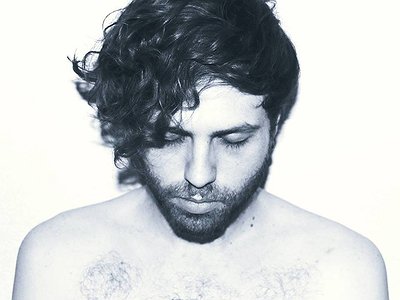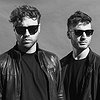Part 1
Name: Crying Vessel / Slade Templeton
Nationality: American
Occupation: Producer, Sound Engineer, Songwriter
Current Release: A Beautiful Curse on Manic Depression Records
Recommendations: One of my all time favorite works is Chopin's Nocturne in C Sharp Minor (No.20) - the reason this is such a powerful piece is I feel it can be so many emotions throughout one piece of music, and projected with nothing but flow and melody along with the decided key. The magic of the Romantic period pianists is the amount of neglect to tempo and in return allows for nothing but dynamics that come and go in a elastic way; and musically coming together and just as fast falls apart. It works just as life does, and I feel its the most sincere form of expression to be able to do this projected only with a piano or single instrument. I dare you to just put it on and look out the window or walk through the park. See how the world comes to you. Its pretty revealing I think to try such a thing.
I am also a huge fan of Danny Elfman. Anything from his band Oingo Boingo or his scoring of films is beyond astounding. I think anyone that is not familiar with him as a modern day composer or his band in the 80s/90s Oingo Boingo, should get to know him and his work more. Of course people know his film music if they watch any Tim Burton films, etc… but his other works have somehow gone under the radar in much of the world (to my amazement). He is a good example of putting the art in music.
Website / Contact: If you enjoyed this interview with Crying Vessel, there is plenty more information on their website or bandcamp profile, which also offers the lyrics to their songs.
When did you start writing/producing music - and what or who were your early passions and influences? What what is about music and/or sound that drew you to it?
I started writing music when I was about 5 years old or old enough to reach the piano keys from the seat. Not sure if it is really ‘writing’ but to my 5 year old brain it was. I used to bring my entire family in during holidays and play random notes and title the piece names like “the storm”; where I would randomly mash the bottom low keys (to represent thunder) and high keys (rain drops) … I'm sure it sounded much better in my little head than what my family heard! Earliest influences were Jean Michel Jarre, Tangerine Dream, Klaus Schulze, Gary Numan, Type O Negative, Pigeonhed, to name a few. My dad raised me on German and European electronic artists. I always liked synths and synthetic sounds. Filters and fx. Something unique or groove centric with a dark tinge always got my excited and inspired.
For most artists, originality is first preceded by a phase of learning and, often, emulating others. What was this like for you? How would you describe your own development as an artist and the transition towards your own voice? What is the the relationship between copying, learning and your own creativity?
This is so very true. I even dressed up as Gary Numan (Tubeway army era) for Halloween when I was a young kid a couple years, and Robert Smith from The Cure another hah. Musically I also pulled from my inspirations in most everything I did growing up. It was sort of like picking apart a recipe as a chef would; but you have to grow and develop your palate enough to be able to taste or know what the tastes you are experiencing comes from. So after many years of doing work with music or audio you can figure out things like “Ah yes… that must have been a Juno 60 with a filter delay added” clear up to when you can tell the difference of a VCA compressor to that of a Vari-mu on a mix. Its an ongoing growth and development and you go into a sort of ‘auto-pilot’ mode when you start to analyze. You hear a song you pick it apart no matter what. This allowed me to also find my own sound and choose what I liked about others works and then slowly became what I like about my own approach or work. You discover yourself. I think without inspiration there is nothing. It all started somewhere and we pull and select and refine that palate to know how to get it to where you personally could and would at the end.
What were your main compositional- and production-challenges in the beginning and how have they changed over time?
At first it was always a challenge to find the right relationship of instruments in terms of octave and key. Certain things need to fit like a puzzle from the start; with the timbre and frequency makeup (and therefore selection of your production decisions) relating in a way that works for later in the song's creation process (i.e. mixing or even mastering). Over time you immediately know that you need to go up an octave on a synth lead to match well with where the voice is or where the guitars may be in the frequency spectrum and also relates to how musical they can be with one another. This and how the melodies of synths or guitars can be intertwined with the vocals to compliment. That was always something that was slowly being developed over time with my work. I am a big fan of call-response where the synth or instrument melody will directly relate to that of the vocal melody or harmonies to carry on the ‘tune’ through out a song.
What was your first studio like? How and for what reasons has your set-up evolved over the years and what are currently some of the most important pieces of gear for you?
My first “studio” was in my parents' basement and consisted of a midi keyboard and Reason 1 with the midi keyboard so sluggish in latency I literally would hit the key and 1 and a half seconds later the note would arrive. My at-home setup has evolved to the newest plugs or programs (I am a Pro Tools user and still Reason user) and as engineer and record producer I got more into the techy side of things over the years. Now I currently am working from a world-class studio (Influx Studios, Bern Switzerland) which I can apply all that I worked with over years into a real world scenario in a professional studio setting with professional clients or musicians. The most important gear to me are the unique ones that give me sounds I can't find elsewhere such as our Space Echo RE-201 or Culture Vulture tubes or how our guitar re-amping setup works (it's marvelous) … and the Space Echo we have sounds so much bigger and dirtier than others I have worked with in the past. You can hear the ‘age’ in it. Like a fine wine.
How do you make use of technology? In terms of the feedback mechanism between technology and creativity, what do humans excel at, what do machines excel at?
That's a very big question I think because it's more of what would I NOT make use of with technology. My music comes entirely from it really. I think the key though is to find a way to use the technology to emphasize what is there musically. For instance; I prefer to track my guitars in a redline scenario (which means recording the whole song in a take) … but then have the very technological (and synthetic) things like electronic percussion, synths or fx being a looped backbone supporting what is organically there and redlined. Same goes for vocals. This wasn't always the case, though. I came from dance production which was entirely loop based, but on the latest Crying Vessel “A Beautiful Curse” album I wanted to focus on the synergy of it all and how it relates to the real world and the technological world on writing, production and engineering and the cohesion that can happen between man and machine. Machines provide us with predictable patterns much better and we can then emphasize with the more emotional or unpredictable emphases that comes from the human elements.
Production tools, from instruments to complex software environments, contribute to the compositional process. How does this manifest itself in your work? Can you describe the co-authorship between yourself and your tools?
The tools absolutely feel like an extension to myself. I try not to over do the quantization when working with live-style music too, because it loses the human form entirely even when performed then quantized. The combination of synthetic and human input is what gets me excited and keeps me writing, and the chosen tools is the main part of this. So this relationship between me and the computer or the gear or technology or instrument is deeper than I probably even realize myself!
Collaborations can take on many forms. What role do they play in your approach and what are your preferred ways of engaging with other creatives through, for example, file sharing, jamming or just talking about ideas?
I have always been involved with many collaborations over the years. My first projects that broke out were done online with people I met over myspace before we had much storage space. One project of mine was chart topping and put us on a world tour before we ever even met in person! Also, another long time collaborator and friend named Dean Garcia (The Eurythmics, Curve, Mick Jagger, SPC ECO) and I started back before we could just plop loads of files online and share, so we had to mail CDrs with data across the ocean from USA to UK with our “sessions” on them. Skip forward to today and you can literally have someone step into your DAW from anywhere in the world to collaborate. It's crazy. I also like to have people explain in visual essence what they prefer when doing a production for a client. Look at art or watch films and get inspired. This goes back to the inspiration thing … it can come in so many forms and this is something that you end up relating to with your collaborators. You may have a mutual love for horror movies, for instance, or an ear for Bach or Beethoven pieces … you never know until you ask and get to know one another in the real world. But what is in the obvious connection is only the start because the true collaboration happens on a much deeper connection than we can see or feel, I think. Making music together with someone is the ultimate connection and it's on a different plane all together. So once you find the like minded connection it goes to a whole other realm.






